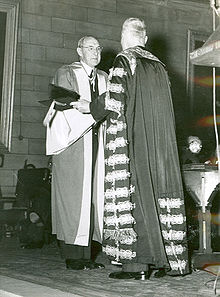Norman Gregg
| Sir Norman Gregg MC |
|
|---|---|

Dr. Gregg (left) receiving an honorary Doctor of Science degree from the University of Sydney in 1952
|
|
| Born |
7 March 1892 Burwood, New South Wales |
| Died | 27 July 1966 (aged 74) Woollahra, Sydney, New South Wales, Australia |
| Fields | Ophthalmology |
| Alma mater | University of Sydney |
| Known for | Discovery of congenital rubella syndrome |
| Notable awards |
|
Sir Norman McAlister Gregg, MC FRACS (7 March 1892 – 27 July 1966) was an Australian ophthalmologist, who discovered that rubella suffered by a pregnant woman could cause birth defects in her child (congenital rubella syndrome).
Gregg was born on 7 March 1892 in Burwood, a suburb of Sydney. He was educated at Homebush Grammar School and Sydney Grammar School, and then studied medicine at the University of Sydney, graduating with a Bachelor of Medicine and Surgery and first-class honours in 1915.
During his education, Gregg was an active and capable sportsman, playing cricket, tennis, baseball, swimming and ice hockey at university. From 1913 to 1914, he represented New South Wales in cricket three times, and once in tennis. Had it not been for the outbreak of World War I, Gregg would have qualified for the Australian Davis Cup team.
After completing his medical degree, Gregg travelled to England, where he was commissioned as a temporary lieutenant in the Royal Army Medical Corps of the British Army on 23 March 1915. He served on the Western Front during World War I attached to the East Yorkshire Regiment's 17th Battalion, and later with the 52nd Field Ambulance. Promoted temporary captain on 23 March 1916, he was an acting major for just over a month in 1919, was wounded in the field, and was awarded the Military Cross for gallantry on 24 September 1918. He left the army on 7 March 1920, retaining the rank of captain.
...
Wikipedia
